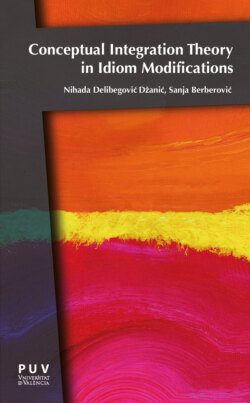Читать книгу Conceptual Integration Theory in Idiom Modifications - Nihada Delibegović Džanić - Страница 9
На сайте Литреса книга снята с продажи.
Оглавление2
Phraseology
Phraseology is referred to as a subdiscipline of the linguistic system which studies structure, meaning and use of phraseological units. Gläser (1998: 125) defines a phraseological unit as ‘a lexicalized, reproducible bilexemic or polylexemic word group in common use, which has relative syntactic and semantic stability, may be idiomatized, may carry connotations, and may have an emphatic or intensifying function in a text’.
The founder of modern research on phraseology is considered to be Swiss linguist Charles Bally. However, it was further developed by Vinogradov (1947), Amosova (1963), and Cherniusheva (1964). Dobrovol’skij and Piirainen (2005a: 30) point out that ‘the beginning of the scientific research on phraseology in the framework of a consistent linguistic theory, i.e. “Meaning-Text-Theory”, can be ascribed to Mel’c&uk (1960)’.
Research on phraseology has awakened the curiosity of many researchers, mainly in Western Europe, but also in the USA. However, the most important works on phraseology were written in Russian, German and French, but because of the language barrier and the Iron Curtain they were not accessible to Anglo-American linguists.1
In the past twenty years the interest in phraseology has grown considerably. The semantic and syntactic properties of phraseological units were the field of interest of many linguists. Scholarly attention has also been focused on different approaches to the synchronic and diachronic description of phraseological units, their pragmatic function in discourse, and cross-linguistic differences.2
Cognitive linguistics and phraseology are inseparable. Idioms present one of the strongest links between phraseology and cognitive linguistics. This claim is based on the fact that idioms present the central problem in phraseological analysis and we are aware that idioms cannot be separated from our conceptual system. The meaning of idioms is far from being arbitrary, it is highly motivated. Motivation is a cognitive mechanism that connects domains of knowledge to idiomatic meanings. Cognitive mechanisms, metaphor, metonymy and conventional knowledge make the meaning of idioms motivated. Many cognitive linguists studied idioms and their behaviour: Lakoff and Johnson (1980), Lakoff (1987), Gibbs (1985, 1986, 1989, 1994, 1995), Taylor (2002, 2003), Ortony (1993), Kövecses (1986, 2000, 2002, 2005), Kövecses and Szábo (1996), Dobrovol’skij and Piirainen (2005), Omazić (2004, 2005a, 2005b) Langlotz (2006), Buljan (2002), Buljan and Gradečak-Erdeljić (2007).
1 Cf. Cowie (1998).
2 Cf. Dobrovol’skij and Piirainen (2005a).
